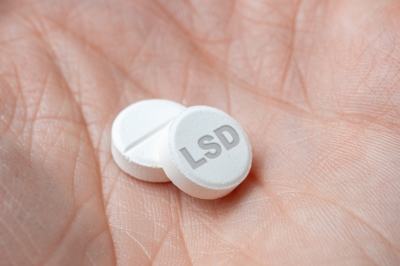LSD, or lysergic acid diethylamide, is a potent psychedelic drug known for its profound effects on the mind and perception. Despite being labeled as non-addictive, the captivating experiences induced by LSD can lead to psychological dependence. This article provides an in-depth look at LSD addiction, its side effects, and effective treatment strategies, highlighting the comprehensive support available at United Recovery Project.
Understanding LSD and Its Addictive Nature
 Lysergic acid diethylamide (LSD), commonly referred to as “acid,” is a potent hallucinogen that significantly alters perception, emotion, and cognition. It is typically ingested orally via tablets, droplets, or blotter paper that dissolves on the tongue. Classified as a Schedule I drug under the Controlled Substances Act, LSD belongs to a category considered to have a high potential for abuse with no accepted medical use. However, emerging research suggests that LSD may have therapeutic benefits for conditions like depression and mental illness such as PTSD.
Lysergic acid diethylamide (LSD), commonly referred to as “acid,” is a potent hallucinogen that significantly alters perception, emotion, and cognition. It is typically ingested orally via tablets, droplets, or blotter paper that dissolves on the tongue. Classified as a Schedule I drug under the Controlled Substances Act, LSD belongs to a category considered to have a high potential for abuse with no accepted medical use. However, emerging research suggests that LSD may have therapeutic benefits for conditions like depression and mental illness such as PTSD.
Although LSD is not physically addictive, its psychological effects can lead to drug dependence. Compared to traditional illicit drugs, the risk of physical addiction and typical drug-seeking habits is lower with LSD. However, there have been reports of psychological dependence, with users developing a tolerance and requiring increasingly larger doses to achieve the same hallucinogenic experiences. This can result in a dangerous cycle of drug abuse. The psychological craving for the intense effects of LSD can drive individuals to continually seek out the drug, leading to various adverse consequences.
Side Effects of Lysergic Acid Diethylamide (LSD) Abuse
LSD use can result in a wide range of sensory distortions, altered thought processes, and intense emotions that can last up to 12 hours. While some users may find these experiences enlightening, others may encounter severe side effects. Common symptoms of LSD abuse include:
- Sweating
- Dry mouth
- Tremors
- Dissociation
- Panic attacks
- Delusions
- Visual hallucinations
- Synesthesia (e.g., “hearing” colors, “seeing” sounds)
- Depression
- Anxiety
- Flashbacks
Additionally, users may develop hallucinogen persisting perception disorder, characterized by visual disturbances, persistent confusion, paranoia, and mood changes. This condition can cause a recurrence of hallucinations and other symptoms for a year or more after LSD use is discontinued.
Tolerance to LSD builds rapidly, necessitating higher doses to achieve the same effect, thereby increasing the risk of severe psychological reactions and bad trips. These side effects can have lasting impacts on mental health and overall well-being.
The risk of overdose with LSD is minimal, and fatal overdoses are virtually nonexistent. However, the drug’s unpredictable effects and the risky behaviors it can induce make it far from safe. During prolonged trips, users often exhibit low inhibition and may react dangerously to hallucinations, leading to injury or other harmful consequences. Mixing LSD with other drugs, particularly antidepressants like lithium, can be particularly dangerous and exacerbate adverse effects. Moreover, LSD can trigger or worsen existing mental health problems such as anxiety, schizophrenia, psychosis, and depression, making it crucial to address concurrent addictions or mental health issues when considering treatment for LSD use.
Physical Withdrawal Symptoms and Timeline
 Although LSD does not cause physical dependence, psychological withdrawal can be challenging. Users may experience depression, anxiety, and intense cravings for the drug. Unlike other substances, LSD withdrawal symptoms are primarily psychological and behavioral, with no significant physical withdrawal symptoms. The timeline for LSD withdrawal varies, with most withdrawal symptoms often peaking within the first few days after the last dose and gradually diminishing over the following weeks.
Although LSD does not cause physical dependence, psychological withdrawal can be challenging. Users may experience depression, anxiety, and intense cravings for the drug. Unlike other substances, LSD withdrawal symptoms are primarily psychological and behavioral, with no significant physical withdrawal symptoms. The timeline for LSD withdrawal varies, with most withdrawal symptoms often peaking within the first few days after the last dose and gradually diminishing over the following weeks.
One potential long-term effect of LSD withdrawal is hallucinogen persisting perception disorder (HPPD), which can cause visual disturbances and a recurrence of hallucinations for a year or more after discontinuing LSD use. Managing these symptoms requires professional support and a structured approach to recovery.
Effective Detox Strategies for LSD Users
Detoxification from LSD primarily involves managing psychological symptoms and providing a safe environment to cope with the effects. LSD detox is crucial for individuals facing addiction and long-term use, as it helps manage withdrawal symptoms and the persistent effects of LSD abuse. Professional detox centers, such as those offered by United Recovery Project, provide structured support through therapies and medical supervision, facilitating a smoother transition to sobriety.
An LSD detox center plays a vital role in providing individualized treatment and managing withdrawal symptoms, ensuring a comprehensive approach to recovery. These programs help individuals address the root causes of their addiction and develop coping strategies to maintain long-term recovery.
Treatment Options for LSD Dependency
A variety of therapeutic approaches have proven effective for treating LSD dependency. It is crucial to address concurrent mental health problems, such as anxiety, schizophrenia, psychosis, and depression, during treatment. These include:
- Cognitive-Behavioral Therapy (CBT): Helps users identify and change the thought patterns contributing to their substance abuse.
- Dialectical Behavioral Therapy (DBT): Focuses on emotional regulation and coping strategies.
- Lifestyle Skills Therapy: Teaches essential skills for maintaining a drug-free life.
- Relapse Prevention Programs: Equip users with strategies to avoid triggers and maintain sobriety.
- Support Groups: Groups like Narcotics Anonymous (NA) offer a community of support and shared experiences.
Each of these treatment options provides a different approach to addressing the psychological aspects of LSD addiction, helping individuals build a foundation for lasting recovery.
LSD and Alcohol: Risks and Interactions
Mixing LSD with other substances, particularly alcohol, can significantly enhance the drug’s effects and increase the risk of dangerous behaviors and health complications. Taking LSD can lead to unpredictable and dangerous effects, including severe hallucinations, impaired judgment, and exacerbation of mental health problems such as anxiety, schizophrenia, and psychosis. Understanding these interactions is crucial for anyone undergoing treatment for LSD abuse. Alcohol can intensify LSD’s psychological effects, leading to more severe hallucinations and impaired judgment. This combination can result in accidents, injuries, and other harmful consequences.
Getting Help: LSD Detox Center at United Recovery Project
For those struggling with LSD addiction, seeking professional help is a crucial step towards recovery. Addressing LSD withdrawal symptoms, particularly the psychological and behavioral aspects, is essential during this process. United Recovery Project offers comprehensive treatment programs designed to provide the support and structure necessary for overcoming addiction. These programs include:
- Medical Detox Center: Ensures safe withdrawal from LSD under medical supervision, helping manage the emotional and mental disturbances that may arise.
- Inpatient and Outpatient Care: Provides structured treatment plans tailored to individual needs.
- Intensive Outpatient Programs: Offer flexible treatment options that allow patients to continue their daily activities while receiving support.
These programs are designed to help individuals achieve long-term sobriety by addressing the psychological and emotional aspects of addiction.


